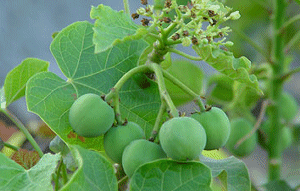


IMPORTANT: The information provided is for information only. The medical claims or advice are not endorsed. Never take any medicines without first consulting a qualified practitioner.

This plant is well known in traditional medicine as a purge. In west Africa, too, people chew the seeds or use chew sticks as a laxative.
Taking physic nut may lead to severe poisoning. Children, especially, may be tempted to try the pleasant-tasting seeds. Animals can also be poisoned. Roasting is said to destroy the toxin they contain (called curcin), but do not rely on this. All parts of the tree are best treated as toxic. The bark is known as a traditional fish poison.
The seed oil has been used as an ingredient in ointments for rheumatism, skin problems and parasitic skin diseases, as well as for fever, jaundice and gonorrhoea, as a diuretic agent and a mouthwash.
In Suriname, northern South America, a medicinal tea of boiled leaves is used to treat gum and throat conditions, for trouble in urinating and constipation, and for backache and inflammation of the ovaries.
The physic nut tree is native to the Caribbean region. It prefers dry habitats and is drought-resistant, and has been introduced as a hedge and ornamental plant to many countries, from Europe to Asia and Australia.
Physic nuts are reported to be very effective against internal parasites such as flukes and nematode worms in goats. The bark has insecticidal and fungicidal properties.
It's been suggested that the seeds might be useful, in a non-lethal dose, in chemotherapy. They contain a chemical (jatrophine), which shows anti-cancerous properties.
Physic nut seed oil is used in candles and soap, and is now being trialed in several countries as a bio-diesel, to replace or mix with petrol-based fuels.